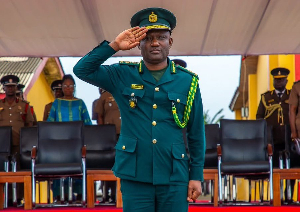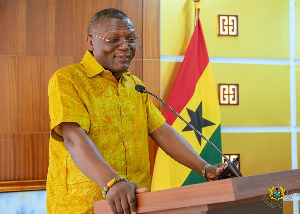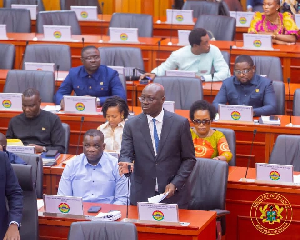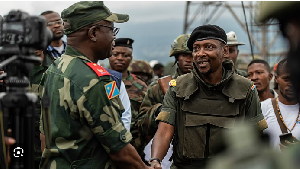Last week, Ghanaians watched with utter amazement as the 8th Parliament of the Republic got off to a most inauspicious start – even before its members were formally sworn it. Never before has Ghana’s parliament been host to physical violence between its members and resultant intervention by not just the police but an army unit as well.
No one could have foreseen what happened in the middle of the night on January 6th even though the hung parliament elected by Ghanaian s a month earlier – at the December 7, 2020 polls – had sent warning that the legislative house has been structured for unprecedented levels of acrimony between members from each side of the already deeply divided polity.
However the surprise sprung on the bemused general populace as the newly elected parliamentarians struggled to elect a new Speaker of the House, having been presented the choice of the Speaker for the past four years in the person of Professor Michael Quaye, nominated by the ruling New Patriotic Party and the country’s longest serving MP in the person of Alban Bagbin, nominated by the opposition National Democratic Congress – is simply a harbinger of a new era in which nothing is assured.
Simply put, the events that took place during the election of a new speaker and indeed the result itself of that election illustrates the worrying fact that uncertainty will rule in Ghana over the coming months, and possibly years.
Indeed, never before have Ghanaians been faced with more uncertainty than what confronts them in 2021. Even 1980, a year that began with a transformational new military regime which had executed a coup in 1979, offered more certainties than what the nation will have to grapple with at the start of 2021.
To be sure this novel situation facing Ghana is in part shared with the rest of the world as humanity starts the New Year in the grasp of an unprecedented global pandemic for the very first time.
A year ago, the world had no inkling of the health and economic crisis about to be visited on them by COVID-19 as they greeted one another with the customary wishes of a happy and prosperous new year at the start of 2020.
This time around the world’s population is grimly aware of the challenges they will have to face; after nearly a full year in the grip of the coronavirus pandemic people have a good idea of the scope of the crisis and its effects on health, society and their economic fortunes.
However the circumstances have changed profoundly over the past month or two, bring new uncertainties that are as dreaded as those that people worldwide had to cope with last year.
Yes, vaccines have been developed and the challenge has now become that of logistics; how to get everyone vaccinated as quickly as possible. Unfortunately Ghanaians, like other Africans, will be near the back of a six billion people long queue.
The situation is worsened by the emergence of a new mutation of the virus which is even more infectious and potentially fatal than the original version. Thus the second wave of COVID-19 infections, which data suggests Ghana is already engulfed in, has the potential to be worse than the first wave and it is not yet clear how effective the various vaccines developed so far – specifically to handle the original version -will be against the new, mutated version.
On top of this, there is no certainty as to how and when Ghanaians will be able to begin accessing any of the several vaccines now becoming available to citizens of the richer jurisdictions around the world, and just as importantly how much it will cost them.
Ghana, caught up in the throes of cut-throat political competition over the past few months has devoted very little attention to the crucial issue of securing and distributing any of the approved vaccines.
Besides Ghanaians, like their counterparts elsewhere around the world, are already suffering from socio-economic restriction fatigue and are likely to resist the enforcement of any new restrictions even as government itself has run out of fiscal space to cope with the effects on its finances and economic performance as a whole, as well as the need to cushion the most economically vulnerable segments of the populace.
Even during the peak of the first wave, most Ghanaians resisted efforts to implement even the most basic COVID-19 protocols such as using face masks and sanitizers and maintaining social distancing.
Since enforcement of those protocols by the relevant authorities was virtually abandoned, largely to accommodate political activity ahead of the December general elections, adherence to them by the general public has almost stopped altogether, particularly in the most intensely populated areas where the potential for spread of the infection is highest.
So far Ghana has not reported any confirmed cases of the new mutated version of the virus, which looks set to dominate the incoming second wave. However with neighbouring Nigeria having reported its first cases, it is matter of when Ghana will become afflicted rather than if.
Apart from the health challenges, for which Ghana’s public health system is now significantly better prepared than it was to confront the first wave nearly a year ago, there will be renewed inevitable economic challenges as well and these have the potential to be devastating.
When the first wave of the pandemic hit Ghana in 2020, government pulled out all the stops in its effort to minimize the adverse effects on the economy and the livelihoods of Ghanaians in general.
This meant heavy subsidies on basic socio-economic public goods and services – most crucially electricity and water; more than a GH¢1 billion in soft medium term loans to small and micro-sized businesses; and free food packages for vulnerable households.
Alongside government’s fiscal stimulus initiatives, the Bank of Ghana implemented monetary stimulus policies such as a major, 150 basis points cut in its benchmark Monetary Policy Rate, as well as reductions in both its required minimum capital buffer for financial intermediation companies and its reserve requirements, all of these aimed at encouraging more commercial lending despite the risk assessment uncertainties imposed by COVID-19, and at lower interest rates too.
Combined the fiscal and monetary policy responses resulted in Ghana’s economic resilience proving better than most other countries all around the world. But although Ghana excelled in comparative terms, it still was hard hit in absolute terms.
Ghana’s economy contracted by 3.2 percent, year on year, during the second quarter of 2020 and contracted by a further 1.1 percent during the third quarter.
Although the latest projections of about 1.9 percent growth for the full year 2020 are better than most other countries around the world, it still implies a sharp slowdown from the world beating growth rates of above six percent per annum achieved between 2017 and 2019.
Besides, Ghana’s exemplary economic resilience against the effects of COVID-19 has come at an inordinately high cost. In September last year Ghana’s public debt to Gross Domestic Product ratio exceeded the generally accepted debt sustainability threshold of 70 percent creating the spectre of acute difficulties in refinancing the national public debt going forward.
Indeed, Ghana'S ambitious intention to issue some US$5 billion in Eurobonds during the first quarter of 2021 will provide a litmus test with regards to the stance of the international, investment community towards Ghana over the near future; while the possibility of raising the amount targeted is still within the realm of possibility considering the international investment community’s favourable attitude to Ghana in recent years, the coupon rates they will demand will provide a crucial insight into how they regard the effects of COVID-19 and the fiscal response on the country’s economic fortunes into the future.
But Ghana also has deep-rooted problems peculiarly of its own. Ghana already has a hung parliament, going by the results declared by the EC and the NDC is contesting two more constituencies too; if it wins even just one of them it would have a parliamentary majority and with the unprecedented acrimony between the two major parties right now, the likelihood of parliamentary co-operation between the two is wishful thinking.
Indeed this has been confirmed by the conduct of parliamentarians during last week’s election of a speaker and the subsequent boycott of President Nana Akufo-Addo’s inauguration ceremony by NDC MPs just a few hours later.
To be sure all the talk of cooperation between the two sides is precisely that – just talk. The actions of both sides of the political divide suggest more intense acrimony than ever before.
Even before the NDC legislators unprecedented boycott of the President’s inauguration and the disgraceful conduct of some MPs during the election of a speaker, the charging to court of 20 NDC legislators – including the Minority Leader – for allegedly threatening the peace by engaging in an illegal gathering as they did a procession to the Electoral Commission’s offices to present an election petition, has done little to douse the intense political tensions gulfing Ghana’s polity currently.
Neither has the NDC’s insistence on continuing to engage in protests – which despite being planned as peaceful ones invariably descent into disorderly conduct – despite their grouse already being considered by the Supreme Court.
A Parliament deeply divided right down the middle along entrenched party lines means even basic legislative approvals may be dragged unnecessarily and more fundamental issues – such as parliamentary approval of the 2021 budget proposals – could be dragged into political mire.
Just as worrying is the prospect of key legislative proposals that will be crucial to economic activity and the restructuring of the economy, being stalled by political bickering.
This year several key bills relating to economic and business activity are expected to be brought before parliament, some of which could be expected to generate intense debate within the House, even if it was structured in its usual form of having a clear majority and a clear minority. A hung parliament as now exists will generate interminable debate.
This means delays, compromises and possibly lack of ultimate agreement altogether in the debate and passing into law of a new investment code for Ghana.
While the failure to present the proposals for major revisions of the GIPC Law originally passed in 1994 has been attributed to the need to incorporate the obligations being created by the newly formed African Continental Free Trade Agreement into it, there are also concerns by government that some of its proposals may be used as political weaponry against it by the NDC.
An example is the tenet of the current investment law that reserves small scale retail trading for Ghanaian enterprises; whether the new proposals retain this tenet or try to change it, ammunition will be derived for government’s political opponents to deride it. Now with a hung parliament, the political opposition will likely try to prevent it from being passed without major changes.
Similarly, the new proposed Mining Law, which presents major changes to the existing one, will, provide grounds for politically inspired opposition. So will the proposed new Insurance Law and the impending anti-competition law, albeit to a lesser – but still significant – extent.
Of course, the hung parliament will also make already very controversial proposals from government so much harder to see through. For instance the hugely controversial Agyapa Gold Royalties initiative aimed at monetizing part of Ghana’s gold royalties – which has faced so much opposition from the political opposition, civil society groups and ultimately government’s own Special Prosecutor that the President ordered the whole process for establishing it to be started all over again – will now have very little chance of receiving parliamentary approval, in anything near its current structure.
The plan to introduce private equity participation into the activities of the Electricity Company of Ghana, whose original initiative, in the form of Power Distribution Services, turned out to be an embarrassing fiasco, will also run into parliamentary heavy traffic too, no matter how government restructures it having learnt from past mistakes.
All this means that at least a significant part of government’s plans for legislation that would underpin the restructuring of Ghana’s economy may be delayed or abandoned altogether due to hostility by half of Parliament. Or not; on the other hand government could salvage the situation by finding ways to get opposition MPs to jettison their party’s position on some of these key legislations especially where their passage would clearly benefit their constituents.
Simply put, no-one can be quite sure as to how Ghana’s parliamentarians will behave – the decision by a yet unidentified NPP parliamentarian elect to vote for NDC’s Alban Bagbin rather than his/her own party’s Professor Michael Quaye as speaker of the house evidences this uncertainty.
Indeed one theory is that following the high level of electoral attrition among MPs at the most recent Parliamentary elections, many will be persuaded to vote in conformance with the needs of their constituents rather than the demands of their respective parties.
Beyond this is the presidential election petition itself brought about by the controversies generated by the December 7, 2020 general elections and the results declared by the Electoral Commission. The opposition National Democratic Congress has refused to recognize the electoral victory of incumbent President Nana Akufo-Addo and is demanding a run-off election with its own candidate John Dramani Mahama.
The Supreme Court will now have to decide whether the NDC’s wishes should be granted. It is instructive that a similar petition by the then opposition New Patriotic Party following the 2012 presidential election failed, averting a prolonged political crisis. However, if the NDC’s claims are proved – as it confidently asserts will happen shortly – then the current situation could become far more complicated.
To be sure, most non-partisan political pundits doubt that this will happen, positing that if the NDC had the incontrovertible proof it claims to have as to post voting manipulation of the results by the EC, it would have made this public right from the start. Again though, this theory is not cast in stone; it will take the justices of the Supreme Court to discern the truth and rule accordingly.
None of this is good for Ghana. The public commentators who assert that the impending judicial tussle is good for the evolution of Ghana’s democracy are simply seeking solace.
Private business, which drives economic performance, abhors uncertainty. Besides the impending judicial contest between the two major parties will drive an even bigger wedge into Ghana’s debilitating political divide, which already has dampened the unity and cohesion of the country’s polity for decades.
Unfortunately there is no way either of these two profound sources of uncertainty can be navigated around; Ghana will have to sail right through them and hope that both the governors – meaning the ruling political elite on both sides of the political divide – and the governed – comprising their supporters in particular and the wider populace in general – do not do anything that can capsize the ship of state as it sails through the turbulent, uncharted waters in front of it.
Opinions of Monday, 11 January 2021
Columnist: goldstreetbusiness.com















